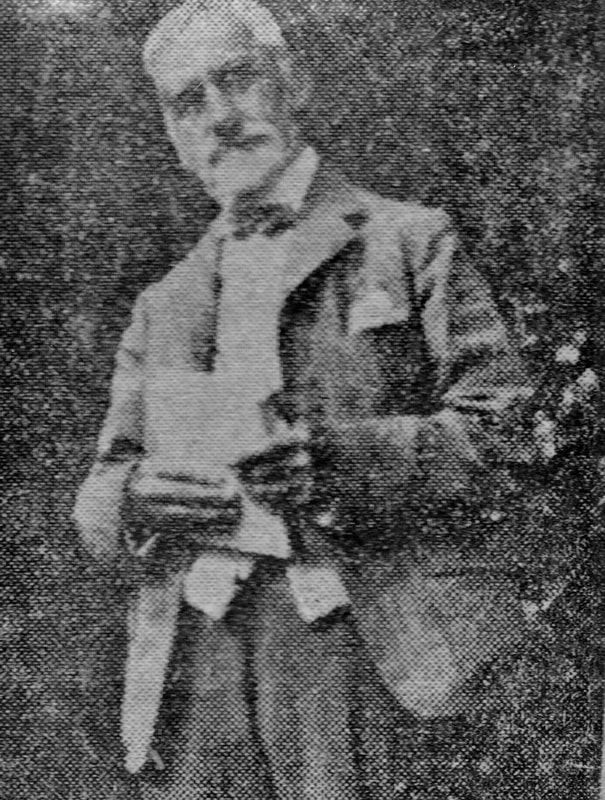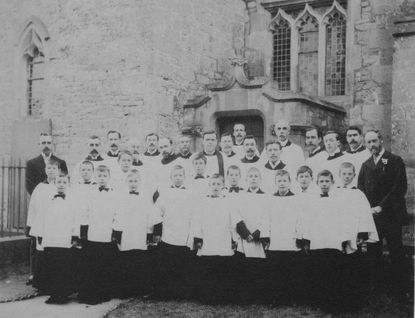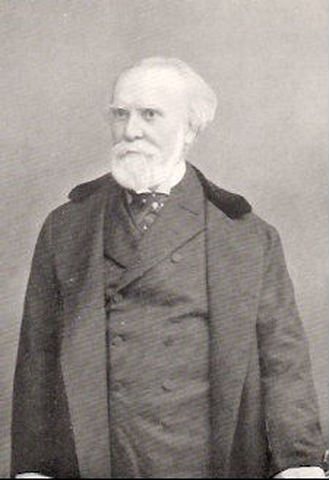|
More Dr James Piri Martin, 1858-1943
Jan Tapscott and David Ibberson, August 2018 When Dr Martin left Box in 1934, the newspaper recorded Visited Patients on Horseback and how 500 residents had raised a farewell gift of £117 as a tribute of affection.[1] He belonged to an older generation of country doctors who rode horseback when visiting patients. Jan Tapscott Contributed Local distinguished people gathered at Bingham Hall to hear the Rev Foster's farewell speech to Dr Martin and to be entertained by local Box man, John Brooke, who spoke of their friendship having begun through a bad tooth which one extracted from the other. If his nasty medicines were a guarantee of cure, then all Dr Martin's patients should have recovered. Dr Martin had ceased to practise as a doctor in 1931 but still devoted himself to meets of the Duke of Beaufort's Hounds. He put his house for sale, still called The Slope of the Bank, advertised as Stone built country residence, approached by wooded drive, 5 bedrooms, stables with loft over, harness room, paddock, unfailing private water supply the whole having an area of 1¾ acres.[2] |
David Ibberson Wrote
Had you lived in Box in the closing years of the 1800s and the first quarter of 1900s then it is almost certain your life was touched by the local Doctor, James Pirie Martin. In his memories of life on Kingsdown, Victor Painter paints a picture of a man of the Victorian age; pompous, yes; arrogant, yes; but nonetheless, a man totally immersed in village life from healing the sick to teaching children to swim. So who was Doctor Martin?
Had you lived in Box in the closing years of the 1800s and the first quarter of 1900s then it is almost certain your life was touched by the local Doctor, James Pirie Martin. In his memories of life on Kingsdown, Victor Painter paints a picture of a man of the Victorian age; pompous, yes; arrogant, yes; but nonetheless, a man totally immersed in village life from healing the sick to teaching children to swim. So who was Doctor Martin?
He was born in Canada in 1856. His Father was an Army Surgeon who married a Canadian woman who was herself the daughter of a Surgeon; so it is not surprising that their son should turn to medicine as a career.
Extracts from his obituary in the Bath Chronicle in 1943 read Dr James Pirie Martin for over 50 years a much loved figure in Box has died in a Bath Hospital where he had been for the last three years. He was aged 85. Dr Martin went to Box when he was 29 having been at Guys and the Chest Hospital, Victoria Park and at the Wiltshire Mental Hospital, Devizes. For the four years previous to his coming to Bath, Dr Martin stayed with Mr Hatcher at the Bear Hotel.
Dr Martin found time to involve himself in all aspects of village life whether it be teaching children to swim as founder of the Box Swimming Club, as Assistant Scout Master, school manager, member of the Box Rifle Club, member of the Parochial Church Council (people's warden for 30 years) and Parish Medical Officer. His wider activities included Freemasonry (633 Devizes Lodge), a Forester of Colerne and a Vice President of the British Israel World Federation. All in all he had a full and rewarding life.
On arriving in Box, Dr Martin lived at Lorne House before building his own house aptly named The Slope of the Hill, in the area opposite the Bear Inn. He stabled his horses close by and employed a groom, a housekeeper/cook and a servant. For the times he lived in some comfort.
The foregoing are statements of facts but if we are to get to know the man we have to turn to folklore and the views of observers. Dennis Richman in his memories of his childhood in Box records that Doctor Martin rode a magnificent chestnut coloured hunter, he used to swear a bit, but no matter, everyone seemed to like and respect him. He also expected boys to touch their caps when he passed by.
Dr Martin found time to involve himself in all aspects of village life whether it be teaching children to swim as founder of the Box Swimming Club, as Assistant Scout Master, school manager, member of the Box Rifle Club, member of the Parochial Church Council (people's warden for 30 years) and Parish Medical Officer. His wider activities included Freemasonry (633 Devizes Lodge), a Forester of Colerne and a Vice President of the British Israel World Federation. All in all he had a full and rewarding life.
On arriving in Box, Dr Martin lived at Lorne House before building his own house aptly named The Slope of the Hill, in the area opposite the Bear Inn. He stabled his horses close by and employed a groom, a housekeeper/cook and a servant. For the times he lived in some comfort.
The foregoing are statements of facts but if we are to get to know the man we have to turn to folklore and the views of observers. Dennis Richman in his memories of his childhood in Box records that Doctor Martin rode a magnificent chestnut coloured hunter, he used to swear a bit, but no matter, everyone seemed to like and respect him. He also expected boys to touch their caps when he passed by.
|
While his prowess with horses is beyond question on more than one occasion his faithful steed rebelled and managed to unseat the unfortunate Doctor. Apparently, one day his groom heard cursing and swearing coming from a room in his house, on looking around the door there was the Doctor stitching a wound in his own head which, as the story goes was the result of him falling from his horse. The quotation physician heal thyself comes to mind. Left: Dr Martin (back row left) as part of Box Church choir |
On another occasion the Doctor was riding along one of the many lanes surrounding Box when his horse stopped, having been startled by a steam engine coming toward them. No matter what our erstwhile Doctor did, the horse refused to budge. A boy observing the battle of wills between the Doctor and the horse was called to the rescue and was told to whip the b..... when commanded. The boy duly obliged. He whipped the horse with all his energy and the horse with Doctor Martin aboard leapt over the hedge. The steam engine passed by, Doctor Martin found his way back to the road, paid the boy a penny and went on his way: the honour of all parties satisfied.
|
My favourite story relates to Doctor Martin's role as verger. I was surprised to learn that choirboys were paid for their services; but not enough, it seems, and they decided to withdraw their labour. This resulted in a confrontation between the boys and the Doctor who was the paymaster. His response was short and sharp, go home to your dung heaps, you’ll get no more money from me! Strike over, the boys all presented themselves at the next choir practice. Whilst we can never be sure of anecdotal stories like these they do reflect the attitudes of a well born Victorian, as Dr Martin was.
His Father's cousin was Sir Theodore Martin, biographer of Prince Albert and friend of Queen Victoria. Sir Theodore (pictured left) was an Edinburgh solicitor, as was his father before him. In about 1845 Sir Theodore moved to London and became head of Martin and Leslie, parliamentary agents. However, he was very much the academic: historian, biographer and political orator. He married Helen Faucit, a famous actress and an acknowledged beauty of her time. Left: Sir Theodore Martin (courtesy Wikipedia) |
When Dr Martin died he left only £209.6s.11d, a small sum really.[3] It does perhaps reflect the fact that he did not practise medicine to generate personal wealth but for the good of the people of Box.
Katherine Harris added:
One day a week after school, old Dr Martin took time off from visiting patients, to encourage children to swim in that part of the brook which was kept clear of weeds for this purpose. Dr Martin, accompanied by those eager to learn, walked to the corrugated iron sheds used as changing rooms, carrying a pole with a rope attached.
One day a week after school, old Dr Martin took time off from visiting patients, to encourage children to swim in that part of the brook which was kept clear of weeds for this purpose. Dr Martin, accompanied by those eager to learn, walked to the corrugated iron sheds used as changing rooms, carrying a pole with a rope attached.
At the end of the rope was a corset of sacking. This was tied round each shivering body in turn, and down the steps into the water the body had to go and endeavour to follow the doctor's instructions. He walked along the bank holding the pole as one would a fishing rod (and woe betide the unfortunate learner who did not obey him) as a ducking would ensue. Nevertheless many Box children learnt to swim this way. For the accomplished swimmers there was a springboard, and for onlookers benches to sit on.
References
[1] Bath Weekly Chronicle and Herald, 29 September 1934
[2] The Wiltshire Times, 14 July 1934
[3] Bath Weekly Chronicle and Herald, 30 January 1943
[4] Katherine Harris, Up the Hill and Down the Hill
[1] Bath Weekly Chronicle and Herald, 29 September 1934
[2] The Wiltshire Times, 14 July 1934
[3] Bath Weekly Chronicle and Herald, 30 January 1943
[4] Katherine Harris, Up the Hill and Down the Hill


